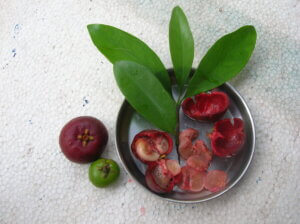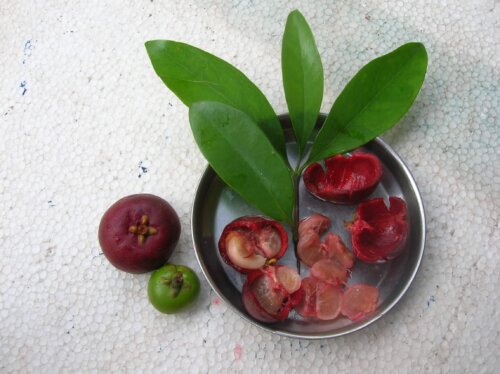Kokum (Garcinia Indica) is one of the numerous traditional medicines that are returning in the quest for natural well-being and overall health. Indian Western Ghats are home to a wealth of the native fruit known as kokum, which has long been valued for its extraordinary medical qualities.
It has gained popularity as a superfood in the wellness industry due to its acidic and energizing flavour and amazing health benefits. To understand why Kokum deserves a special place in your daily wellness regimen, Let’s embark on a trip.

What is kokum?
kokum is a tropical fruit that is native to India’s Western Ghats. Maharashtra, Goa, Karnataka, and Kerala are famous for it. When ripe, the cherry-sized, tiny, round fruit turns an intense reddish-to-purple colour. It is a well-liked ingredient in Indian cuisine, especially in coastal and regional dishes because of its acidic and somewhat sour flavour.
Along with its culinary use, it is valued for its therapeutic qualities. It is a nutritional powerhouse because it is packed with antioxidants, vitamin C, and other necessary nutrients. It is commonly used in Ayurvedic medicine to improve overall health, ease heat-related pain, and help with digestion.
It is also used for producing kokum butter, which is made from the fruit’s seeds. Due to its moisturizing and therapeutic qualities, kokum butter is a useful component in skincare products.
Kokum benefits
1. Digestive Support
kokum was originally used as a digestive tonic because of its carminative effects. Those with indigestion problems can benefit from it since it improves digestion, reduces bloating, and lowers acidity.
2. Weight loss
Kokum’s hydroxy citric acid (HCA) content has been connected to possible advantages for weight loss. HCA may help in appetite suppression, prevent the storage of fat, and help healthy weight loss efforts.
3. Anti-Inflammatory
Kokum has anti-inflammatory qualities, it can help treat arthritis such as rheumatoid and gout while also reducing pain.
4. Antioxidant Powerhouse
Kokum is high in antioxidants like garcinol and anthocyanins, protects cells from oxidative stress, fights free radicals, and lowers the risk of chronic diseases.
5. Cooling and Hydrating
kokum is a great treatment for heatstroke and dehydration because of its cooling effects. Kokum juice is a refreshing thirst quencher that keeps the body hydrated.
6. Immune Booster
Kokum’s high vitamin C level helps the immune system, helping the body in fighting off diseases and infections.
7. Skin Health
Antioxidants in kokum shield the skin from UV ray damage, delaying the onset of premature ageing and preserving a youthful appearance. Kokum butter, which is made from the plant’s seeds, is a fantastic all-natural moisturizer that helps to promote soft, supple skin.
8. Heart Health
The potassium in kokum helps heart health by lowering the risk of cardiovascular problems and helping in maintaining healthy blood pressure levels.
9. Reduced tension
The natural calming effects of kokum can help lower tension and anxiety, improving general mental health.
10. the health of the digestive system
The anti-ulcerogenic effects of kokum can help to protect the gastric lining, lowering the risk of gastric ulcers and improving gastrointestinal health.
11. Antimicrobial Effects
According to certain research, kokum has antimicrobial properties that could help fight off some bacteria and fungi.
Even though kokum has many positive health effects, it’s important to speak with a doctor before using any kokum supplements or extracts, especially if you have any underlying medical issues or are taking medicines.
When used wisely, including kokum in your diet or wellness routine can improve your general well-being and further your search for natural health.
Related: Black Sesame Seeds: 16 Health Benefits And Nutritional Values
Nutritional profile
Due to its sour flavour, the flesh of this fruit is often just used for cooking and medicine. Here is an overview of Kokum’s nutritional profile:
Vitamins
Kokum is rich in vitamin C (ascorbic acid) which is essential for boosting the immune system, increasing collagen production for healthy skin, and acting as an antioxidant to protect cells from oxidative stress.
Minerals
Kokum is rich in important minerals like manganese, magnesium, and potassium. Magnesium and manganese support bone health and a variety of biochemical processes in the body, while potassium helps in maintaining healthy neuron function and fluid balance.
Antioxidants
The fruit is rich in anthocyanins, garcinol, and hydroxy citric acid (HCA), among other antioxidants. These antioxidants protect cells from oxidative stress, fight free radicals, and promote overall health and well-being.
Hydroxycitric Acid (HCA)
Kokum contains a natural substance called hydroxy citric acid (HCA), which is thought to have potential advantages for weight loss. It can help in reducing hunger, prevent the storage of fat, and help healthy weight loss efforts.
Dietary Fiber
Kokum includes dietary fibre, which helps to promote good digestion, and regular bowel movements.
Calories and Fats
Kokum is a healthy complement to a balanced diet because of its low calorie and fat content.
Carbohydrates
The fruit’s naturally occurring sugars, which are the fruit’s basic source of carbs and give it its pleasantly sweet flavour, are also present.
It’s important to remember that depending on factors like ripeness and processing, the nutritional value of kokum may vary slightly. Fresh fruit may not be consumed in big numbers very often, but extracts, juice, and supplements from it are used widely for their varied health advantages.
As with any meal or supplement, moderation is essential if you want to enjoy it’s benefits as part of a healthy diet.
Related: Black Lentils: 9 Amazing Benefits and Nutrients
Kokum butter
The seeds of the kokum (Garcinia indica) fruit are used to make kokum butter, a natural butter. It resembles cocoa butter in texture and is solid at room temperature. Due to its great moisturizing qualities and numerous skin advantages, kokum butter is widely used in the cosmetic and skincare industries.
Kokum butter benefits
- Kokum butter, a rich moisturizer that helps in nourishing and hydrating the skin, is a perfect ingredient for creams, lotions, and balms.
- The butter made from Kokum is non-comedogenic, which means that it does not clog pores. All skin types, especially sensitive and acne-prone skin, can use it because of this.
- The antioxidants in kokum butter can support healthy, youthful-looking skin and aid in skin regeneration.
- Kokum butter creates a barrier on the skin that guards against moisture loss and environmental harm.
- Its calming qualities make it beneficial for illnesses like eczema and psoriasis because they can soothe dry, itchy, or irritated skin.
- Kokum butter is a well-liked component in lip balms, body butter, and massage creams because of its texture, which softens and smoothes the skin.
- Kokum butter has a stable shelf life that extends the life of the items it is utilized in by preventing acidity.
Uses in Indian Cuisine
Indian cuisine often includes the spice kokum, especially in the coastal states of Maharashtra, Goa, Karnataka, and Kerala. It gives a variety of foods a unique tangy, somewhat sour flavour. Kokum is a common ingredient in cuisine, including:
Kokum Juice: The juice made from kokum is a cool and delicious beverage that is frequently made in the summer to battle the heat and stay hydrated.
Kokum Sherbet: Made by combining Kokum juice with sugar, jaggery, and water, kokum sherbet is a sweet and sour beverage.
Kokum Saar: Traditional Konkani Kokum Saar is a coconut and Kokum-based curry that is frequently eaten with rice or as a side dish.
Fish and Seafood Curries: Fish and seafood curries typically include kokum, which brings out the taste and counteracts the dish’s richness.
Pickles: Kokum is used to make pickles, giving the fruits or vegetables that have been kept a delicious sourness.
Chutneys: A spicy, sour chutney that goes well with rice meals and snacks is kokum chutney.
Uses in Ayurveda Medicine
Ayurvedic medicine is recognized by Kokum for its therapeutic qualities and health advantages. Known as a “cooling” fruit in Ayurveda makes it is useful for balancing Pitta dosha and excessive heat. The following are some common Ayurvedic uses for kokum:
Digestive Tonic: Kokum is used as a digestive tonic to relieve acidity, bloating, and indigestion. It aids in triggering the release of digestive enzymes, facilitating easier digestion.
Appetite Suppressant: Kokum is thought to have qualities that might suppress appetite, helping in weight management, according to Ayurveda.
Gastrointestinal Health: Kokum is used to improve digestive health, maintaining the lining of the stomach and lowering the risk of gastric ulcers.
Skin Care: Antioxidants found in kokum are used in Ayurvedic skincare products to protect skin from UV ray damage and preserve a healthy complexion.
Analgesic and anti-inflammatory: Kokum is used by Ayurvedic doctors to relieve pain and inflammation related to illnesses like arthritis because of its anti-inflammatory qualities.
Mental well-being: Kokum’s relaxing qualities are believed to help lower stress and anxiety, which promotes mental well-being.
Kokum is frequently used by ayurvedic practitioners as herbal powders, extracts, or in combination with other herbs to treat particular health issues. To receive specific guidance and ensure safe use, it is important to speak with a licensed Ayurvedic practitioner before using Kokum or any other herbal medicines.
Also, read this: Where Do Sesame Seeds Come From History, Tradition And Health
How to prepare and store kokum
The process of preparing and preserving kokum is simple. Here is a step-by-step manual to help you in getting the most out of this wonderful fruit:
Preparing Kokum
- Rinse kokum properly under running water before using it to get rid of any dirt or harmful substances.
- To extract the flavours and tanginess of kokum before using it in dishes, it is frequently necessary to soak it
- Put the kokum in a basin and cover it with warm water. To soften and release its taste, soak it for 15 to 20 minutes.
- After soaking, strain the kokum and throw the water away. You can then include the strained kokum in your meals.
As previously indicated, soak the kokum in water to make Kokum juice or sherbet. Kokum should be soaked before blending with wet water to create a thick pulp.
For the kokum concentration, strain this mixture using a cheesecloth or sieve. To make kokum juice or sherbet, combine this concentrate with some water, sugar, and salt to taste.
Storing Kokum
Dried Kokum: Kokum that has been dried should be kept in an airtight container and kept out of direct sunlight in a cold, dry location. Dried kokum preserved properly can keep its flavour for several months.
Kokum Juice Concentrate: You can keep kokum juice concentrate that has been made for up to a week in the refrigerator. Maintain it in a spotless, sealed container.
Kokum Pickle: If you’ve produced any chutney or pickles with kokum, preserve them in sterile, airtight jars. To increase shelf life, refrigerate the jars, and to prevent contamination when removing pickles, always use clean, dry spoons.
Also read this: How to Store Cherries: 5 Tips To Keep Cherries Last Longer
What is kokum called in India?
Kokum is known by several different local names throughout India. It is known as “Aamsol” or “Amsul” in Konkani, whereas “Kokam” is the word for it in Marathi. It is known as “Goraka” in Hindi, “Kodampuli” in Malayalam, “Bindin” in Bengali, and “Punarpuli” in Kannada, among other local names. Indian cuisine makes a lot of the fruit, especially in coastal areas, and traditional Ayurvedic treatments value it for its therapeutic qualities.
Is it good to drink kokum daily?
Because kokum juice has a high amount of antioxidants and vitamin C, using it in moderation as part of a healthy diet is generally safe and beneficial. However, if you have any health issues or are on medication, you should avoid excessive drinking and speak with your doctor right away.
What is kokum called in Ayurvedic?
Is kokum good for health?
Kokum is indeed beneficial to health. It contains anti-inflammatory qualities, helps in digestion, improves weight control, is high in antioxidants, and advances skin health. However, when introducing kokum into the diet, moderation and individual considerations are important.
Conclusion
In conclusion, kokum is a delicious and beneficial gem that enhances both Ayurvedic and Indian food. In addition to adding a flavorful explosion to recipes, its nutritional capabilities and antioxidants improve general health. It is a beneficial ingredient in traditional healthcare because of its gastrointestinal support, anti-inflammatory capabilities, and relaxing benefits.
We embrace the knowledge of earlier generations and the wealth of nature as we enjoy the flavor and advantages of kokum. Let us enjoy the delicious treats it gives us and look ahead to its nurturing embrace as we go toward natural wellness. We value the entire harmony that Kokum provides and celebrate the symbiosis of taste, health, and tradition with it as a friend.

